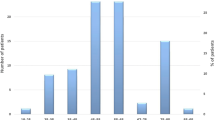Abstract
Seventy-three multiparous women with stress incontinence were evaluated before and 1 year after anti-incontinence procedures to assess the effects of successful surgical therapy on the personality of patients with genuine stress urinary incontinence. Urodynamic studies were used to assess the urinary incontinence; Taylor-Johnson temperament analysis was used to evaluate the personality characteristics of the subjects; and paired t-tests and t-tests were performed for statistical analysis. Nine of the 73 patients were excluded because of invalid answers on the questionnaire. Of the remaining 64, 57 (89%) were subjectively cured and 51 (80%) were objectively cured. The preoperative temperament evaluation revealed, in all the patients, traits of depressiveness and quietness which were significantly different from the normal range of the average population. Postoperatively, the authors found significantly (P<0.05) reduced depressiveness and increased social involvement, demonstrativeness and self-discipline only in the women subjectively cured. A trend was noted in terms of psychosocial adaptation between the patients cured and the ones with persistent incontinence. However, due to the small number of failures (n=7) no statistical differences could be demonstrated. It was concluded that women with stress urinary incontinence have increased depressiveness and decreased psychosocial involvement compared to the average population. Successful anti-incontinence procedures significantly improve the psychosocial status of these individuals.
Similar content being viewed by others
References
Moore KH, Sutherst JR. Response to treatment of detrusor instability in relation to psychoneurotic status. Br J Urol 1990;66:486–490
Norton PA, MacDonald LD, Sedgwick PM, Stanton SL. Distress and delay associated with urinary incontinence, frequency and urgency in women. Br Med J 1988;297:134–136
Hunskaar S, Vinsnes A. The quality of life in women with urinary incontinence as measured by the Sickness Impact Profile. J Am Gerontol Soc 1991;39:378–382
Morrison LM, Eadie AS, MacAlister A et al. Personality testing in 226 patients with urinary incontinence. Br J Urol 1986;58:387–389
Walters MD, Taylor S, Schoenfeld LS. Psychosexual study of women with detrusor instability. Obstet Gynecol 1990;75:22–26
Crisp A, Sutherst J. Psychological factors in women with urinary incontinence. J Psychosom Res 1991;35:1–10
Macaulay AJ, Stern RS, Stanton SL. Psychological aspects of 211 female patients attending a urodynamic unit. J Psychosom Res 1991;35:1–10
Wyman J, Harkins S, Choi S, Taylor J, Fantl J. Psychosocial impact of urinary incontinence in women. Obstet Gynecol 1987;70:378–380
Rosenzweig BA, Hischke D, Thomas S, Nelson A, Bhatia NN. Stress incontinence: psychological status before and after treatment. J Reprod Med 1991;36:835–838
Millard RJ, Oldenbuer BF. The symptomatic, urodynamic and psychodynamic results of bladder re-education programs. J Urol 1983;130:715–719
Obrink A, Fedor-Freybergn P, Hjelmkvist M et al. Mental factors influencing recurrence of stress incontinence. ACTA Obstet Gynecol Scand 1979;58:91–94
Taylor RB, Morrison LP. Taylor-Johnson Temperament Analysis Handbook. Los Angeles: Psychological Publications Inc., 1984
Abrams P, Blaivas JG, Stanton SL, Anderson JT. Standardization of terminology: the standardization of terminology of lower urinary tract fuction recommended by the International Continence Society. Int Urogyencol J 1990;1:45–58
Author information
Authors and Affiliations
Rights and permissions
About this article
Cite this article
Elia, G., Kraemer, J. & Bergman, A. Personality changes after anti-incontinence operations in women. Int Urogynecol J 5, 141–145 (1994). https://doi.org/10.1007/BF00386626
Issue Date:
DOI: https://doi.org/10.1007/BF00386626




